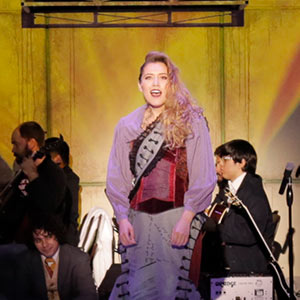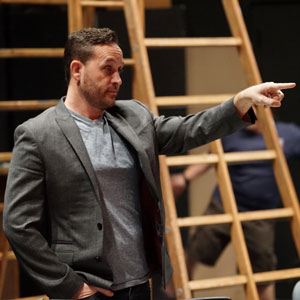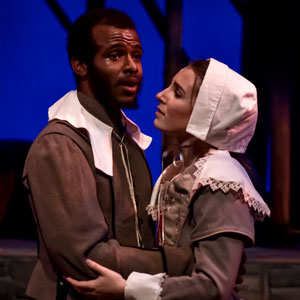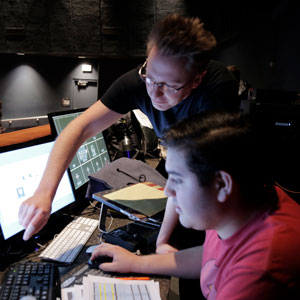Shakespeare's 'Macbeth' Commands Better
— - Catherine Drummond - Monday, November 3rd, 1997Passionate, booming voices, strings of intricate and polished dialogue and dense plots revolving around fatal human flaws such as lust, greed, murder and self conflict. It's just what you'd expect in a performance of Shakespeare.
"Macbeth,", Fullerton College's first stage show of the year, directed by Charles Ketter, took on a tremendous task, artistically and dramatically, in presenting a play by one of the most challenging of playwrights.
Ketter succeeds in bringing to life war tor 14th century Scotland in an intricate sophisticated set of a weather beaten castle set upon the rolling moors of Scotland's countryside. It is the scene of very well staged, but at times unpolished duels and sword fights.
Macbeth (Patrick Dall'Occhio), is one of the king's most trusted generals, and Banquo (Graham J. Jackson), are warriors in a recent but victorious battle. Learning this, King< Duncan praises them for their courage.
Although not present, Macbeth is bestowed the title "Thane of Cawdor" and learns this when greeted by two messengers. Later MacBeth learns that Malcolm, the king's eldest son was appointed Prince of Cumberland, successor to the throne.
Giving in to his desire for power, Macbeth entertains the idea of killing the king. Enthusiastically coaxing MacBeth is Lady Macbeth (Erin McReynolds) who lusts for a higher societal position.
The thick, sordid but nevertheless entertaining plot places Macbeth in the center of much controversy as those who suspect his crime watch the shame and guilt eat away at him. Inch by inch, as with King Claudius in Hamlet, he is driven to insanity as his friends come closer to the truth.
Given the intensity of events mixed with Shakespeare's trademark dialogue, the actors sometimes lapse into racing speech, causing a problem in their delivery and in the audience's enjoyment.
With so few people with trained ears for Scottish accents, (which come and go on stage) and those who have never experienced "live" Shakespeare, the audience sometimes has to work as hard as the actors to hear the intricate and amazing monologues and soliloquies.
When the audience's only preoccupation is straining to hear it's hard to find a character to despise or sympathize with. Because Macbeth is only on stage for a short time before he commits murder, the audience is not able to understand his internal conflict.
Something that comes to mind when hearing the dialogue is a saddening realization that there is some unwritten rule that actors need to perform Shakespeare by constantly forcing out the dialogue with loud booming voices or playing an emotion.
There was hope that the primary actors would take possession of their characters, not how they've heard them or seem them played.
Considering how many times Macbeth has been reprised as a film, it must have been increasingly difficult to find interesting but truthful variations with the characters.
For those on Fullerton's stage it was hard to find the truth in what was said. Perhaps it might have been the difficult dialogue that overshadowed so much enthusiasm and energy that everyone brought to the stage.
One character, the Porter (Chad McFarlane) stood out like the gravediggers in "Hamiet," who provided
an interesting and humorous relief from the seedy plot with each "Knock, Knock, Knock!"
Not to be overshadowed by character difficulties, the actors and technical support worked very professionally with the timing of soundand light cues and scene changes.
Half of the success of Fullerton's "Macbeth" were due to many of the battle scenes set in "Braveheart" fashion (without blue and white faces). Engaged with more than a pair of dueling actors the fighting was executed quickly and excellently staged.








